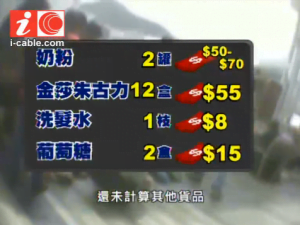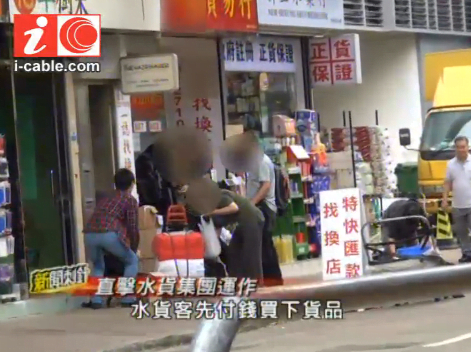i-Cable News video report 追縱水貨集團背後運作
This is Real Hong Kong News‘ full transcript of an exclusive story on #smuggling activities in #HongKong by 有線新聞 i-Cable News.
NOTE: Parallel good traders engage in the illegal activity of bringing goods from Hong Kong to China that are subjected to heavy tax. The correct term to address them, hence, should be smugglers. The transcript below will be using the words “smugglers” and “smuggling” despite the media based in Hong Kong, China and the Western world who have been using the term “parallel traders” and “parallel goods trade”.
From Smugglers to Organised Smuggling Group
FULI. TRANSCRIPT
Retail goods are laid out in front of this money exchange shop in Sheung Shui. The signs detailed the retail price and commission amount of each product.
Woman handling out money (HK$500): “This is your first time (to smuggle), bring more with you. It’s a good first opportunity!”
Smugglers would first pay for the products they “purchase”. Then they would bring the products and the receipt to find the “contacts” across the border in China, as listed on the receipt following address written on the receipt, to complete the transaction. After crossing the border, our undercover reporter arrived at the “collection point” near Lo Wu Station:
Undercover reporter: “Is this the “collection point?”
Smuggler ‘contact’: “Yes.”
As soon as our reporter handed over the products she brought from Hong Kong to China, the ‘contact’ immediately paid her back the total amount of the products plus ‘commission’. By bringing two tins of formula milk powder (legal limit) to China, a smuggler can make between HK$50 and HK$70. On top of this, there are many other products one can bring:
 2 tins of baby formula powder: HK$50-70
2 tins of baby formula powder: HK$50-70
12 boxes of Ferrero Rocher: HKS55
1 shampoo: HK$8
2 boxes of glucose powder: HK$15
CableTV reporter: An average smuggler crosses the border twice a day. If one brings the maximum each trip, one can make a few hundred HK dollars commission per day. But how do the organisations behind the trade make money? Let us first see where do all these products go.
The collection point of this smuggling organisation is located in Shenzhen. At least 5-6 vans travel to and from this collection point every day non-stop from early morning to late at night to transport goods. Each of these vans goes to different destinations: some go straight to logistic companies whilst some go to nearby warehouses.
CableTV reporter: We pretended to be the owner of a shop that sells Hong Kong products in China and approached the owner of the money exchange shop in Sheung Shui. We told him that we wanted to buy I-long Kong products from them, and successfully arranged to meet with him.
When we arrived at his shop in Liantang (near HK/China border), he told us that he is one of the largest smuggling groups in Sheung Shui and can provide us Hong Kong products in large scale.
Smuggling group representative: “We are open about our profession. We specialise in ‘parallel trade’. We are one of the largest four at the moment, but should be set to be the largest by the end of this year. 1500tins of formula milk powder a day, not a problem! The problem is if you buy them all.”
Smuggling groups hire individual smugglers to transport products from Hong Kong to China via land transportation bit by bit, the method is called ‘Ants moving home’. These groups will then transport these Hong Kong products to wholesalers and retailers in China. The smuggling group representative we met told us that after deducting the ‘commission’, transportation cost and warehouse rental, the net profit of a tin of formula milk powder is around HK$3. This may seem like a small margin, but…
Smuggling group representative: “We do not only focus on one type of product! We make HK$5 for each pack of Yakult (5 bottles) we sell, and we make HKS3 for each box of coffee we sell. But formula powder is a must have item! We do not receive a lot of formula powder (from the individual smugglers), but we can get tens of thousands of coffee powder every day! You do the maths about how much we make.”
Recently, a large number of ‘Hong Kong products’ shops are emerging in China. Smuggling Hong Kong products to China means custom duty is completely evaded. Therefore, the business of smuggling groups becomes bigger and bigger.
The smuggling group representative we spoke to said that they have warehouses in Sheung Shui, Tuen Mun and Shenzhen. Some of the smuggled products are supplied to the ‘Hong Kong products’ shops in Dongmen, whilst the rest are distributed across China.
Undercover reporter: “You distribute across China?”
Smuggling group representative: “Yes, Peking (Beijing), Sichuan, Shanghai…”
Undercover reporter: “You have retail centres in all these places?”
Smuggling group representative: “Not retail centres, we only supply (Hong Kong) products to the local operators. We are the terminal, we don’t do retail.”
What is the background of this smuggling group? We found out the shop where we met with this representative, is a retail shop of MBL Wine Group in Shenzhen. However, this shop does not open for business on any day.
This wine group is headquartered in Hong Kong with shops in Hong Kong, Macau and Taiwan. The representative told us that he is a shareholder of MBL Wine Group.
Smuggling group representative: “MBL is the parent company, and we open our own company to ‘do business’ in China. The parent company has its own operation, we have our own. MBL sells alcohol only!”
We contacted Candy Law, former Miss Asia, celebrity and one of the Board of Directors of MBL Wine Group, to ask her about a shareholder of MBL Wine Group who operates a smuggling business under the name of MBL Wine Group.
Candy Law: “Ha? No. This must be a joke.”
And we interviewed MBLWine Group’s spokesperson, who said:
Huang Yong (Chairman of MBL Wine Group): “He is our franchisee. His relationship with our company is contractual on wine sales.”
CableTV reporter: “Do you know about it (the smuggling operation)?”
Huang Yong: “Our company does not know about it. He owes our company some money, and we are still trying to recover the debt.”
After the interview, we wanted to seek comments from the smuggling group representative at the money exchange shop in Sheung Shui. However, his phone was not answered. The products displayed outside of his money exchange shop in Sheung Shui had all disappeared.
This transcript of the i-Cable TV report was created by Real Hong Kong News


RT @bcmagazinehk: Smuggling: The Process and Who’s Behind the Trade:
http://t.co/FLzAWdjzew #umhk #occupyhk #umbrellamovement #hongkong